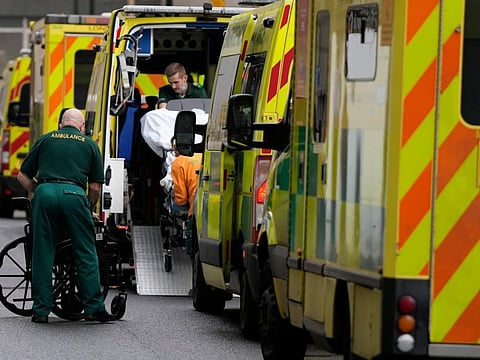UK ambulance workers strike again, piling pressure on NHS
Strikes have spurred the government to push through new laws to limit risk to public

London: The UK health system faces a moment of peril Wednesday as ambulance workers hold a second strike and officials urge the public not to call emergency services unless it’s a matter of life-or-death.
Members of two unions, Unison and the GMB, are walking out as part of an ongoing dispute over real-terms pay cuts suffered by staff in the National Health Service. Government officials were in discussion with unions until midnight Tuesday with no resolution, Health Secretary Steve Barclay said.
The protests will affect much of England and Wales and follow a strike by emergency workers in the run-up to Christmas - the first for three decades. The strikes have spurred the government to push through new laws to limit the risk to the public and people have been told to only phone for an ambulance in a life-threatening situation.
“The fact that we were still negotiating right through to midnight obviously gives a sense of the difficulty that we’ve had, and why it is proportionate to have, as they do in other European countries, some legislation to have that minimum safety standard,” Barclay told Times Radio on Wednesday.
Excess deaths in England and Wales jumped at the end of 2022, with a mixture of flu, cold weather and restrictions on access to emergency care likely to have contributed, according to figures from the Office for National Statistics published Tuesday. The number of registered deaths was 20% above average in the week ending Dec. 30 and 21% above average during the previous week.
“If there are delays to ambulances, obviously, it is concerning in terms of our ability to care, but we’ll be working with the unions constructively on what cover they will put in place,” Barclay said, when asked if the strikes were contributing to excess deaths.
Barclay took a more emollient tone on the issue after Business Secretary Grant Shapps accused ambulance drivers of “putting lives at risk.” He was speaking on Tuesday as he introduced anti-strike legislation to the House of Commons as the government tries to minimize disruption from industrial action across a number of sectors.
GMB National Secretary Andy Prendergast called Shapps a “chancer” in an interview with Bloomberg Radio and said the new strike legislation is something Russian President Vladimir Putin would do.
Shapps is “talking about issues that frankly he doesn’t understand in order to score political points,” Prendergast said.
Under the proposed law, minimum service levels would be required on strike days for fire, ambulance and rail services, with the government consulting on the adequate level of coverage. In a string of broadcast interviews on Tuesday, Shapps said Britain was following the example set by other European nations, including France and Germany.
Unions criticised the proposals, with Mick Lynch, general secretary of the National Union of Rail, Maritime and Transport Workers, calling them “an attack on human rights and civil liberties,” and the Trades Union Congress vowing to fight them “every step of the way.” Lynch is due to speak to a committee of MPs in Parliament on Wednesday morning.
Backdated pay
With discontent sweeping the NHS, nurses are due to stage more strikes later in January while junior doctors and physiotherapists are also planning industrial action.
Teachers and doctors are also threatening to join the wave of strikes.
Ministers on Monday held talks with unions across a range of sectors. They failed to stem planned strikes, although the government stance in opposition to the pay demands of health care workers appeared to have softened, with Barclay telling union officials he was open to backdating their next pay rise.
The government has so far refused to countenance re-opening public sector pay discussions for the current tax year, saying ministers have followed in full the recommendations of independent pay-review bodies. But the unions have also stood firm, saying extra pay for this year is a key demand. The backdating proposal could be a creative workaround, allowing all sides to say they haven’t compromised on their principles. The Daily Mail reported on Wednesday that Chancellor of the Exchequer Jeremy Hunt is opposed to the idea of any extra payments.
The legislation put forward by Shapps also covers healthcare, education, nuclear decommissioning, border security and other modes of transport, but those sectors will be subject to voluntary agreements on minimum service levels, the government said last week.
“We hope to reach minimum service agreements so that we do not have to use the powers,” Shapps told the Commons.



